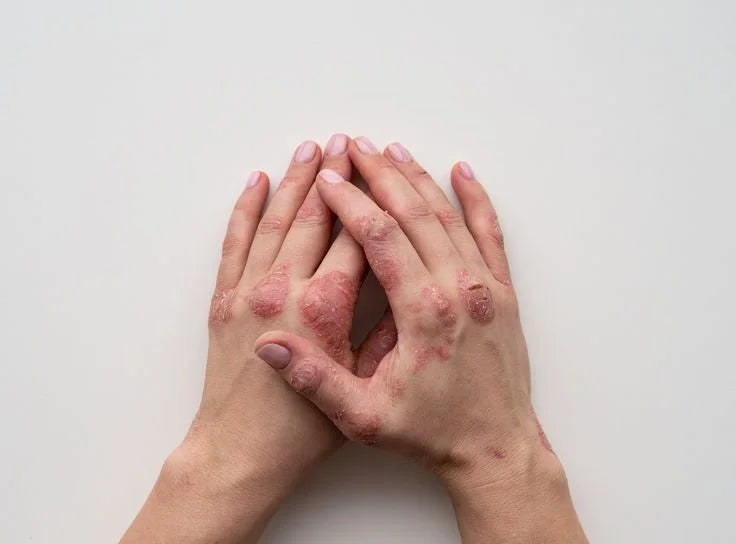Introduction
Eczema, a common yet often misunderstood skin condition, affects millions of people worldwide. Characterized by dry, itchy patches on the skin, eczema can significantly impact an individual's quality of life and self-confidence. This blog post aims to shed light on the causes and triggers of eczema, debunk common misconceptions, explore current treatments and their effectiveness, and highlight the role of stress in eczema outbreaks. We'll also delve into exciting advancements in the field that could pave the way for a cure.
Causes and Triggers of Eczema

Eczema's exact cause remains unknown, but it's believed to result from a combination of genetic and environmental factors. Some people inherit genes that make their skin more susceptible to irritation. Environmental triggers, like dust, pollen, and pet dander, can also provoke an outbreak. Additionally, certain foods, fabrics, and soaps may trigger eczema flare-ups in sensitive individuals. Identifying and avoiding triggers is crucial in managing eczema.
Debunking Common Misconceptions
There are many misconceptions surrounding eczema, leading to stigma and misinformation. One common belief is that eczema is contagious. In reality, it's a chronic skin condition with no chance of spreading from person to person. Another misconception is that eczema
Common Misconceptions about Eczema
Several myths surround eczema, leading to misunderstanding and stigma. Contrary to popular belief, eczema is not contagious, and it is not caused by poor hygiene. It is a chronic condition with no known cure yet, but it can be managed with proper treatment and lifestyle modifications. Eczema also varies significantly from person to person, both in severity and in what triggers an outbreak. This makes it challenging to make generalizations or blanket statements about the condition.
Current Treatments for Eczema
While there is no cure for eczema, various treatments can help manage and alleviate symptoms. These include topical creams and ointments, oral medications, light therapy, and in severe cases, immunosuppressant drugs. However, treatment effectiveness varies

Current Treatments and Effectiveness
While there is currently no cure for eczema, a range of treatments can control symptoms and prevent flare-ups. Topical creams and ointments, often containing corticosteroids, can reduce inflammation and itching. Regular use of moisturizers can help restore the skin's natural barrier and prevent dryness. In severe cases, physicians may prescribe antihistamines or immunosuppressants. It's important to remember that what works for one person may not work for another, and managing eczema often involves some trial and error.
The Role of Stress in Eczema Outbreaks

Psychological stress can have a significant impact on eczema. Stress triggers a response in the body that can lead to inflammation and an eczema flare-up. Techniques such as mindfulness, meditation, and regular exercise can help manage stress levels and potentially reduce the frequency and severity of eczema outbreaks. Additionally, seeking support from mental health professionals or joining a support group can also aid in managing stress and improving overall well-being.
Lifestyle Changes to Manage Eczema
Along with proper treatment and stress management, making lifestyle changes can also help manage eczema. Avoiding harsh chemicals and irritants, such as certain soaps and detergents, wearing soft cotton clothing, and taking shorter showers with lukewarm water can all help reduce eczema symptoms. Limiting exposure to environmental allergens, such as pollen or pet dander, can also prevent flare-ups. Additionally, maintaining a healthy diet and staying hydrated are important for overall skin health.

The Importance of Skin Care Routine
Establishing a daily skin care routine is crucial in managing eczema. This includes gentle cleansing with mild, fragrance-free soap and lukewarm water, followed by immediate application of moisturizer to lock in moisture. It's also important to avoid scratching or picking at the affected areas, as this can further irritate the skin and lead to infection. Regularly trimming fingernails short can help prevent unintentional scratching.
Future Research into Curing Eczema
The quest for a cure for eczema is ongoing, and exciting advancements are on the horizon. Emerging therapies, including biological drugs and small molecules targeting specific immune responses, show promise in clinical trials. While these treatments are still being tested for safety and effectiveness, they represent a significant step forward in the fight against eczema.
Conclusion
While living with eczema can be difficult, understanding the condition and staying informed about the latest treatments can make a significant difference. Remember, if you're struggling with eczema, you're not alone, and professional help is available. Don't hesitate to reach out to a healthcare professional for advice tailored to your situation. For more insights and updates on eczema and other skin conditions, subscribe to our newsletter. Together, we can demystify eczema and work towards a future free from its impacts.
